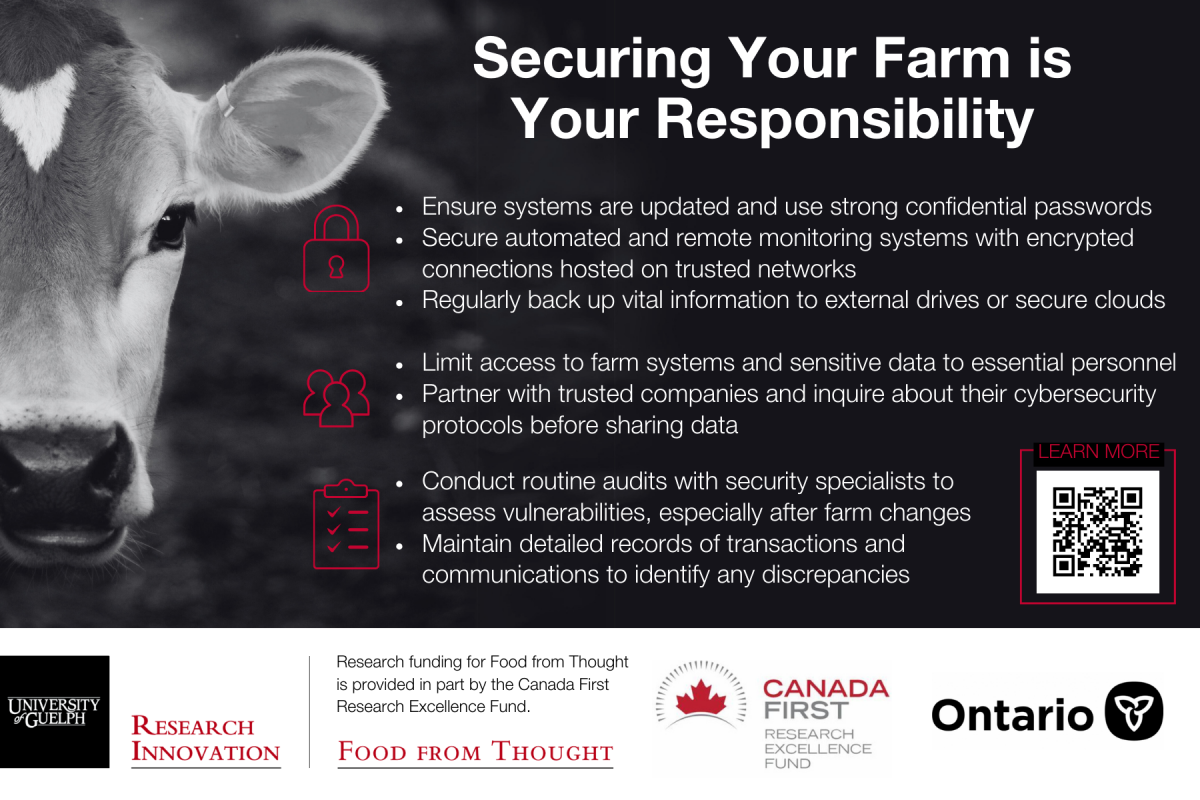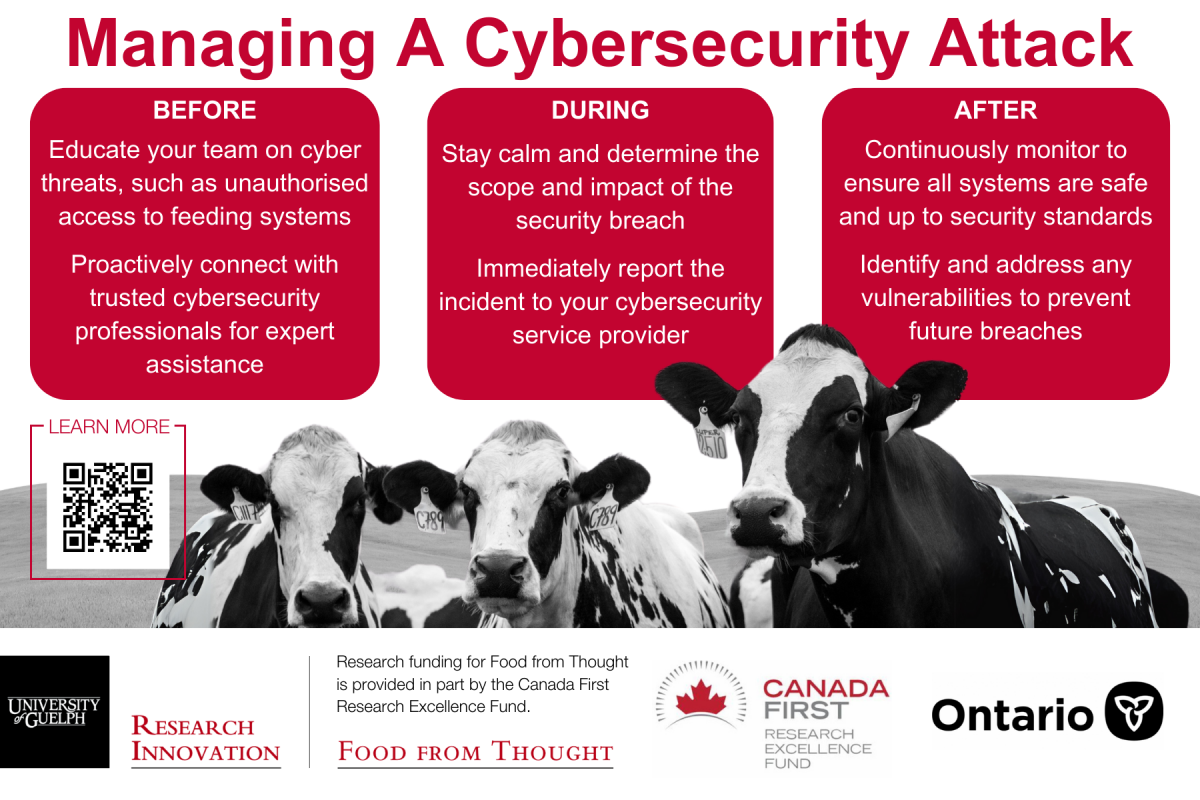Are You Protecting Your Farm from Cyber Attacks?

Updated: September 9, 2024
Canadian farms are home to cutting-edge technology; automated feeding systems, robotic tools with precise calibrations, remote-access surveillance systems, and intricate datasets spanning generations are just some of the valuable technical assets of a modern farm.
But what if hackers brought your whole enterprise to a standstill?
Financial assets are the most obvious target for hackers, but for farms, the consequences could be even more disastrous. Shutting down a barn’s systems could quickly become deadly for livestock without temperature control or automated feeding systems. Medical, genealogical, and productivity data could all be erased or tampered with, and untangling these databases could easily take years. And yet, the agricultural industry does not currently have robust protection systems or security regulations in place to track or prevent these disasters.
Supporting farmers to prevent, manage, and recover from cybersecurity attacks has become a passion of Dr. Ali Dehghantanha, an Associate Professor in the School of Computer Science at the University of Guelph and founding director of the Cyber Science Lab, the Canadian Cyber Foundry, and the Master of Cybersecurity and Threat Intelligence Program at the University of Guelph. It’s an endeavor that has led to several panicked phone calls in the middle of the night from farmers asking for help restoring their hacked systems, underscoring the importance of providing cybersecurity resources for the agricultural sector.
He feels it’s not a matter of if a farm will experience a cyberthreat, but instead, when. Although more robust policies and guidelines are needed to better protect all Canadian agricultural enterprises, there are some steps that farmers and producers can take to control their own farm’s vulnerability to attack.
Below are Dr. Dehghantanha’s tips on preventing cyberattacks on your farm, as well as advice on how to manage an attack before, during, and after it occurs.
On-Farm Cybersecurity Prevention
Safeguard your automated systems:
-
- Make sure your robots and automated feeding systems are not connected to the wider network, other than when advised by the vendor.
- Ensure they are located in secure areas where physical access is controlled or restricted.
Protect your data management and analytics platforms:
-
- Use strong, unique passwords or enable 2-factor authentication (if provided) for your herd management and production analytics platforms.
- Make sure that all your data is encrypted.
- Regularly back-up your data to an external drive or secure cloud service to protect against data loss (suggest daily, but at least weekly).
- Remind staff to keep passwords confidential and should not be shared or publicized (e.g. avoid posting in clearly visible areas).
- Before sharing data with any third-parties ask them to provide in writing what cybersecurity measures they have in place and if they have insurance for cyber attacks.
Secure your supply chains and logistics networks:
-
- Choose well-established and trusted companies for handling your transportation and logistics.
- Ask your vendors how they protect both their own and clients' data and stay informed of any cyber-attack impacting them and how they would notify oyou of a breach.
- Maintain records of all your transactions and communications. This diligence helps in quickly identifying and addressing any discrepancies or suspicious activities in your supply chain.
Defend your environmental sensors and controls:
-
- Ask yourself if any parts of your infrastructure need to be remotely accessible or not. If there is no real business need, do not enable remote access to any part of your environment.
- If remote access is required, such as remote monitoring, make sure that only a limited number of well-secured mobile or client devices are allowed for remotely accessing your environment. Make sure all remote accesses are encrypted.
- Consider hiring a security specialist to conduct a risk and vulnerability assessment for all remotely accessible devices in your farm. We recommend regular quarterly security assessment, but at least make an assessment whenever there is a change in your organization or infrastructure (e.g. after staff changes or equipment upgrades).
Shield your research and development data:
-
- Secure all your farm's research and development data, including breeding records, feed formulation, and yield improvement strategies, using strong passwords and encryption.
- Limit access to this sensitive information to only essential personnel and consider regular audits to ensure its safety.
- Regularly back up this data to an external drive or secure cloud service to protect against data loss.
Managing a Farm Cyber Attack
Pre-incident:
Educate Your Team on Farm-Specific Cyber Threats: Conduct regular training for your team to enhance their awareness and response capabilities against farm-specific cyber threats, such as unauthorized access to production data and feed formula manipulation. We suggest quarterly training, but once a year is must!
Evaluate Cybersecurity Professionals and Companies That Can Assist During an Incident: Cyber-attacks are inevitable; it's only a matter of when and how often they will occur. Proactively assess and engage with reputable cybersecurity firms or professionals who specialize in agricultural and dairy systems, ensuring rapid, expert assistance in the event of a cyber incident. Reach out to your vendors or contact the Cyber Science Lab if you need any help!
During incident:
Stay Calm and Perform an Initial Assessment: Maintain composure during a cyber incident and swiftly conduct an initial assessment to identify the scope and impact of the breach, focusing on critical systems like feeding systems, milking machines, and data storage.
Contact Cybersecurity experts or Service Providers Immediately: Immediately reach out to your cybersecurity support or service provider for assistance, providing them with a concise yet comprehensive overview of the incident for prompt resolution.
Always Use Cybersecurity Professional Services to Address the Incident: Engage with qualified and independent cybersecurity professionals to effectively address and mitigate the cyber incident, leveraging their expertise to navigate through the crisis and minimize potential damage.
Post-incident:
Continuous Security Monitoring: After resolving a cyber incident, it's crucial to implement continuous security monitoring and adhere to compliance standards, ensuring that all systems are secure and any vulnerabilities are promptly addressed to prevent future breaches.

